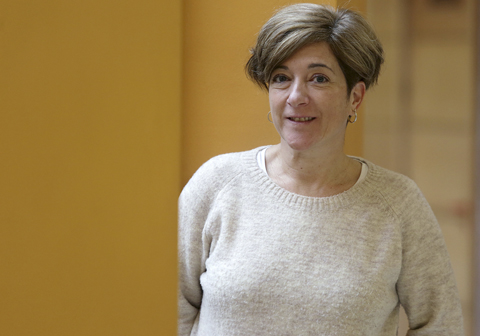According to a study conducted by the UPV/EHU at various schools in the BAC, a multilingual approach is not applied when languages are taught because each multilingual student is regarded as a sum of monolingual speakers and languages are taught completely separately. The researchers say that more general approaches to language teaching, ones that take advantage of transfers between languages, are becoming more widespread nowadays and schools here do have the pedagogical bases to be able to establish and spread this approach.
-

Euskal Herriko Unibertsitateak ikasturteari hasiera emateko ekitaldia egin du
-

45.000 ikasle baino gehiagorekin hasi da 2024/2025 ikasturtea UPV/EHUn
-

Lorea Argaratek jasoko du Gladys saria
-

Gantza, gure elikadurako funtsezko elementua
-

UPV/EHUk nazioarteko 2.000 ikasle baino gehiago izango ditu ikasturte berrian
In the Basque Autonomous Community languages are taught completely separately without making use of transfers between languages
According to a study by the UPV/EHU-University of the Basque Country, schools in the BAC (Basque Autonomous Community) do not use a multilingual approach when teaching languages
- Research
First publication date: 05/12/2017

A study conducted in the UPV/EHU’s Department of the Theory and History of Education by the lecturer Elizabet Arocena and supervised by the Ikerbasque researcher Durk Gorter and the UPV/EHU professor Jasone Cenoz, reveals that in schools in the BAC the multilingual approach is not widespread, yet it has emerged that according to what has been seen in the classrooms and written work "the pedagogical bases" do exist “for establishing and spreading the multilingual approach in schools”.
As the lecturer and researcher Arocena explains, “multilingual speakers do not isolate or separate languages in their heads. In other words, multilingual speakers are not the sum of monolingual speakers. They go beyond language frontiers, because they use what has been learnt in other languages in their weakest language, for example”. What is more, many international researchers currently cast doubt on the tendency to teach languages separately, and are in favour of a more general approach, the multilingual approach; in other words, they propose teaching resources so that what is learnt in one language can be used in other languages.
Arocena’s research has sought to explore how far the multilingual approach is widespread in Basque schools and whether the pedagogical bases exist to establish or spread that approach. To do this, language teachers were interviewed and their lessons were observed to gather the teachers’ views and to analyse how they gave their lessons; in addition, to examine the students’ tendencies, students were asked to complete a questionnaire so that general information could be gathered (age, mother tongue, which language they use, when, etc.) and three pieces of their written work were analysed.
Pedagogical bases
The researcher gathered the opinions and beliefs of many teachers. Among other things, the teachers stressed that when teaching languages, they regard the students as monolingual, and that the aim is to reach the level of a monolingual speaker of the language, even though they know that it is very difficult to achieve that level in three languages. The teachers also believe that at school there should be no mixing of other languages as a classroom resource, that no code-switching should be made, but Arocena confirmed that when languages are taught, other languages are used more than thought, particularly when it comes to explaining vocabulary and difficult concepts.
On the other hand, the conclusion drawn from the students’ written work is that they break down the fences created by the monolingual approach, because in one language they use what they have learnt in other languages. Indeed “we have seen that, besides transferring vocabulary, the students are capable of transferring punctuation, text organisation and content,” said Arocena. According to the researcher, the features of their written work reveal that “the speaker needs to be regarded as multilingual because he/she does not write differently in one language or another. We often fail to take all that into consideration, because it is important to bear in mind what resources the students use as multilingual speakers: if they know how to do one thing in one language, why not teach them how to transfer it to their other languages? And why not use that transfer in the process to learn another language?”
Additional information
This piece of research is part of the PhD thesis written up by Elizabet Arocena-Egaña (Deba, 1971) in the Department of the Theory and History of Education of the UPV/EHU’s Faculty of Education, Philosophy and Anthropology. The thesis is entitled Multilingual Education: Teacher’s Beliefs and Language Use in the Classroom, and the research was conducted using data gathered in various Primary and Secondary Schools in the BAC in 2012, 2013 and 2014.




